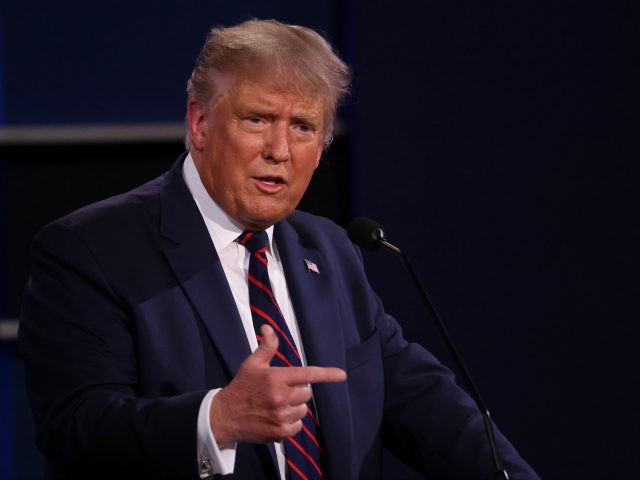Hu Xijin, editor of China’s state-run Global Times, wrote an editorial on Saturday seeking applause for sending well-wishes to President Donald Trump and first lady Melania Trump.
The previous day, Hu celebrated Trump’s illness as “paying the price” for mishandling the coronavirus pandemic in a now-deleted tweet.
“President Trump and the First Lady have paid the price for his gamble to play down the Covid-19 [Chinese coronavirus],” Hu crowed in the Twitter message he would later delete. “The news shows the severity of the U.S. pandemic situation. It will impose a negative impact on the image of Trump and the U.S., and may also negatively affect his re-election.”
Hu’s editorial on Saturday made no mention of the controversial post he deleted. Instead, he recalled retweeting some best wishes from a Chinese Foreign Ministry spokeswoman and said it was “only normal to be supportive and wish him and his wife, Melania, well through their recovery.”
After one paragraph of happy thoughts, Hu went back to politicizing the pandemic, castigating the U.S. Congress for “attacking China” by accurately noting that the coronavirus came from there. He repeated the Chinese Communist Party’s (CCP) worn-out line that America should stop “shifting blame” for the pandemic to Beijing and deal with its own alleged failures to control the disease:
Donald and Melania Trump’s recent COVID-19 infections further expose the vulnerability of the US in handling the global pandemic, but the rest of the world avoids talking about this subject out of sympathy and general politeness. The US government and Congress should keep a low profile in this regard, in line with international public opinion. However, their performance at the hearing clearly shows they intend to stir up the “debate” even further. Their actions are disrespectful toward the Trump family and fail to create a supportive environment they need to recover.
China and the US should seek to cooperatively handle the global pandemic. It would benefit both the US, as it still struggles with the pandemic, as well as the rest of the world. It would be sad if some US politicians refuse to accept this common-sense approach due to their shortsightedness.
Hu concluded by demanding applause for China’s alleged restraint in response to America’s outrageous blame-shifting, confidently asserting that no one else in the world holds the CCP responsible for the pandemic that killed thousands and trashed the global economy:
Meanwhile, it is only natural that Chinese people feel upset with the US’ increasingly extreme China policy, especially as some US politicians slander China over the pandemic. However, I hope that Chinese people restrain themselves when they comment on Trump’s infection. Such restraint would be noticed in the internet era with highly globalized information, and will lead to positive impacts, though no one has the right to point fingers at Chinese society’s narratives and behaviors.
The CCP certainly has bullied and cajoled a remarkable number of people in other countries into holding it blameless for the pandemic, but the long-term outlook for Chinese Communism’s global relations remains uncertain.
CNBC noted on Sunday that Chinese tech companies and certain key exports, such as medical equipment, did very well during the pandemic and foreign companies are eager for a piece of the action in China’s recovering consumer market, but the push toward “decoupling” from Chinese markets and supply chains is a real problem. Global business interests will be given billions of reasons to forget about China’s role in spreading the coronavirus, but there is also growing unease about the security of Chinese tech products.
“What Covid has done is that it has accelerated everything – especially in geopolitics of technology. The tech decoupling, which may have taken place slowly over the next decade, is now well underway,” Abishur Prakash of the Toronto-based Center for Innovating the Future told CNBC.
Ironically, the sector of Chinese industry that seems likely to suffer the least lingering damage from post-pandemic decoupling is the booming biotech industry, with several billion-dollar international development deals on the table.

COMMENTS
Please let us know if you're having issues with commenting.